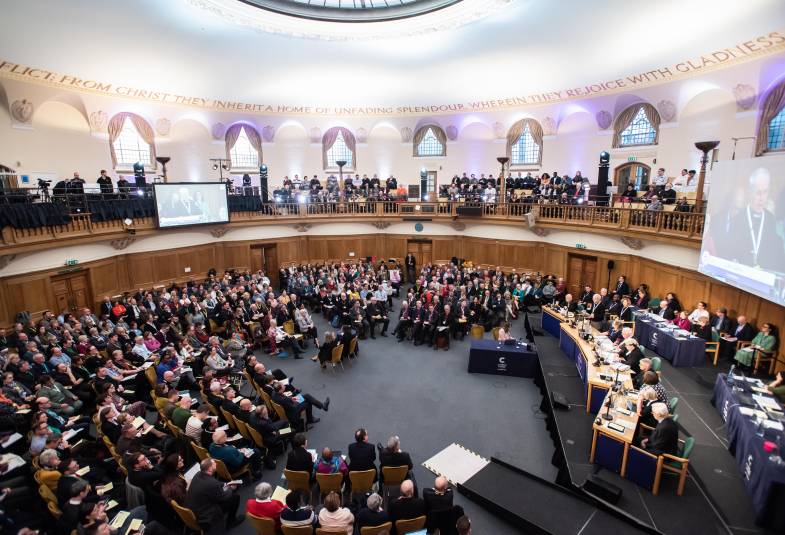09/02/2023

Synod members also voted to “lament and repent” of the failure of the Church to welcome LGBTQI+ people and for the harm that LGBTQI+ people have experienced – and continue to experience – in churches.
A motion which details and recognises a series of proposals put forward by the bishops on human identity and marriage was agreed by majorities in the Houses of Bishops, Clergy and Laity after a landmark debate over two days.
Earlier this week Synod members also met in small groups to consider and comment on a set of draft texts known as Prayers of Love and Faith, which could be used voluntarily in churches for couples who have marked a significant stage of their relationship such as a civil marriage or civil partnership.
Synod’s comments will now guide the bishops as they refine those texts carefully and prepare new pastoral guidance for the Church on sexuality and marriage in the coming months before the prayers are formally commended for use in churches.
The Archbishop of Canterbury, Justin Welby, and the Archbishop of York, Stephen Cottrell, said: “It has been a long road to get us to this point.
“For the first time, the Church of England will publicly, unreservedly and joyfully welcome same-sex couples in church.
“The Church continues to have deep differences on these questions which go to the heart of our human identity.
“As Archbishops, we are committed to respecting the conscience of those for whom this goes too far and to ensure that they have all the reassurances they need in order to maintain the unity of the Church as this conversation continues.
“We hope that today’s thoughtful, prayerful debate marks a new beginning for the Church as we seek a way forward, listening to each other and most of all to God.
“Above all we continue to pray, as Jesus himself prayed, for the unity of his church and that we would love one another.”
The Bishop of London, Sarah Mullally, who led the debate and chairs the group which oversaw the development of the proposals, said: “This is a moment of hope for the Church.
“I know that what we have proposed as a way forward does not go nearly far enough for many but too far for others.
“It is my prayer that what has been agreed today will represent a step forward for all of us within the Church – including LGBTQI+ people – as we remain committed to walking together.
“We have always said we will listen carefully to Synod, so over the next few months we will reflect on everything which has been said and prepare new pastoral guidance for the Church on matters of sexuality and marriage. We will also refine the texts of Prayers of Love and Faith.”
Notes to Editors
The full motion, as amended, put to Synod was:
That this Synod, recognising the commitment to learning and deep listening to God and to each other of the Living in Love and Faith process, and desiring with God’s help to journey together while acknowledging the different deeply held convictions within the Church:
- lament and repent of the failure of the Church to be welcoming to LGBTQI+ people and the harm that LGBTQI+ people have experienced and continue to experience in the life of the Church;
- recommit to our shared witness to God’s love for and acceptance of every person by continuing to embed the Pastoral Principles in our life together locally and nationally;
- commend the continued learning together enabled by the Living in Love and Faith process and resources in relation to identity, sexuality, relationships and marriage;
- welcome the decision of the House of Bishops to replace Issues in Human Sexuality with new pastoral guidance;
- welcome the response from the College of Bishops and look forward to the House of Bishops further refining, commending and issuing the Prayers of Love and Faith described in GS 2289 and its Annexes;
- invite the House of Bishops to monitor the Church’s use of and response to the Prayers of Love and Faith, once they have been commended and published, and to report back to Synod in five years’ time;
- endorse the decision of the College and House of Bishops not to propose any change to the doctrine of marriage, and their intention that the final version of the Prayers of Love and Faith should not be contrary to or indicative of a departure from the doctrine of the Church of England.’
Votes were recorded as follows:
Bishops 36 for, 4 against, 2 abstained
Clergy 111 for, 85 against, 3 abstained
Laity 103 for, 92 against, 5 abstained